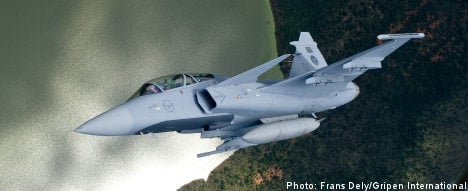The Swedes are joined by French and US defence companies that have stepped up their campaigns following reports that the Brazilian government is likely to delay its decision until October at the earliest.
France’s Dassault, which is fielding its high-tech Rafale fighter, had been seen as the frontrunner up to now because of a guarantee to share all technology with Brazil – a key requirement of the tender.
But Sweden’s Saab, offering a new generation of its cost-effective Gripen jet, and US aerospace giant Boeing, plugging its F/A-18 Super Hornet, have sought to blunt that advantage.
Saab president Ake Svensson told reporters in Sao Paulo on Thursday that not only would Gripen technology be offered, but Brazil stood to benefit by participating in future exports of the Swedish jet, which is poised to go into production.
Bob Kemp, Saab’s sales and marketing director, said that because the supply chains for Dassault and Boeing were already defined, “we have a program and they have products” to offer.
Boeing’s executive vice-president, Jim Albaugh, likewise stressed to journalists last week in Sao Paulo that the US Congress was being asked to allow an “unprecedented” level of technology-sharing with Brazil around the F/A-18.
At stake is not only the right to supply Brazil with 36 modern fighters to replace its 12 outdated French Mirage jets from 2014 – but also a chance to carry a winner’s glow into a much bigger, $10 billion tender India has underway to buy 126 fighters.
The chosen aircraft will be the spearpoint of Brazil’s air force for the next three decades.
Brazil, which struck a deal last year to buy four French submarines and co-develop a nuclear sub, is seeking the military clout to match its growing economic power and regional political ambitions.
Jean-Marc Merialdo, the head of Dassault’s office in Brazil, told AFP on Thursday there was still some time to go before the winner was decided and a contract signed.
“Let’s uncork the champagne once it’s signed,” he said, expressing caution.
He said he was confident the Rafale was the best option on the table, being more sophisticated and manoeuvrable than the F/A-18 and more powerful than the Gripen.
He also noted that France’s technology-sharing was certain, while US technology – which applied to part of the Gripen, whose engine is made by General Electric – was subject to political approval by US lawmakers, who have resisted such transfers in the past.
Boeing, though, has pointed out that the Rafales were costly and none have yet been sold outside of France, while the F/A-18 has been taken up by the Australian air force.
Saab emphasizes that its Gripen is the cheapest option of the three, and is built to land on highways – a consideration for Brazil, which has to police the vast Amazon jungle.
Brazil’s media had said an air force evaluation of the three jets was to be submitted to the government this month, with a possible decision announced on September 7 – during Brazil’s Independence Day celebrations which, coincidentally or not, French President Nicolas Sarkozy had been invited to attend.
But the bidding companies said the air force report now would not be ready until next month, pushing back the whole process – and giving them more time to make their respective pitches.



 Please whitelist us to continue reading.
Please whitelist us to continue reading.
Member comments